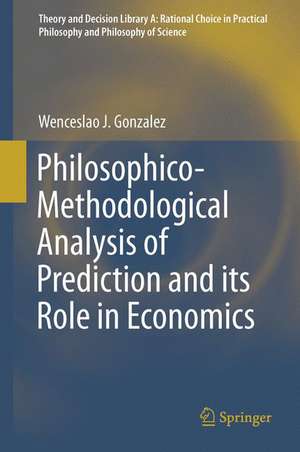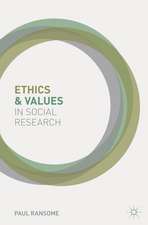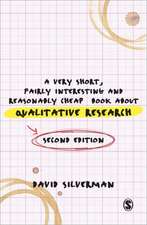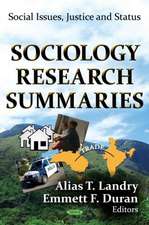Philosophico-Methodological Analysis of Prediction and its Role in Economics: Theory and Decision Library A:, cartea 50
Autor Wenceslao J. Gonzalezen Limba Engleză Hardback – 20 mar 2015
Within this context, the research is organized in five parts, which discuss relevant aspects of the role of prediction in economics: I) The problem of prediction as a test for a science; II) The general orientation in methodology of science and the problem of prediction as a scientific test; III) The methodological framework of social sciences and economics: Incidence for prediction as a test; IV) Epistemology and methodology of economic prediction: Rationality and empirical approaches and V) Methodological aspects of economic prediction: From description to prescription. Thus, the book is of interest for philosophers and economists as well as policy-makers seeking to ascertain the roots of their performance. The style used lends itself to a wide audience.
| Toate formatele și edițiile | Preț | Express |
|---|---|---|
| Paperback (1) | 644.63 lei 6-8 săpt. | |
| Springer International Publishing – 6 oct 2016 | 644.63 lei 6-8 săpt. | |
| Hardback (1) | 651.02 lei 6-8 săpt. | |
| Springer International Publishing – 20 mar 2015 | 651.02 lei 6-8 săpt. |
Din seria Theory and Decision Library A:
- 18%
 Preț: 952.40 lei
Preț: 952.40 lei -
 Preț: 382.57 lei
Preț: 382.57 lei - 18%
 Preț: 958.25 lei
Preț: 958.25 lei - 18%
 Preț: 949.23 lei
Preț: 949.23 lei - 18%
 Preț: 1232.09 lei
Preț: 1232.09 lei - 15%
 Preț: 643.34 lei
Preț: 643.34 lei - 18%
 Preț: 948.92 lei
Preț: 948.92 lei - 15%
 Preț: 581.79 lei
Preț: 581.79 lei - 15%
 Preț: 644.49 lei
Preț: 644.49 lei - 15%
 Preț: 642.83 lei
Preț: 642.83 lei -
 Preț: 389.70 lei
Preț: 389.70 lei - 18%
 Preț: 947.67 lei
Preț: 947.67 lei - 15%
 Preț: 641.20 lei
Preț: 641.20 lei -
 Preț: 388.90 lei
Preț: 388.90 lei - 15%
 Preț: 640.37 lei
Preț: 640.37 lei - 18%
 Preț: 952.26 lei
Preț: 952.26 lei - 15%
 Preț: 641.20 lei
Preț: 641.20 lei - 18%
 Preț: 953.35 lei
Preț: 953.35 lei - 18%
 Preț: 952.89 lei
Preț: 952.89 lei - 18%
 Preț: 951.47 lei
Preț: 951.47 lei - 15%
 Preț: 636.94 lei
Preț: 636.94 lei - 18%
 Preț: 944.82 lei
Preț: 944.82 lei - 15%
 Preț: 643.84 lei
Preț: 643.84 lei - 18%
 Preț: 1383.81 lei
Preț: 1383.81 lei - 18%
 Preț: 1331.51 lei
Preț: 1331.51 lei - 20%
 Preț: 641.99 lei
Preț: 641.99 lei - 15%
 Preț: 647.40 lei
Preț: 647.40 lei
Preț: 651.02 lei
Preț vechi: 765.90 lei
-15% Nou
Puncte Express: 977
Preț estimativ în valută:
124.58€ • 133.21$ • 103.87£
124.58€ • 133.21$ • 103.87£
Carte tipărită la comandă
Livrare economică 18 aprilie-02 mai
Preluare comenzi: 021 569.72.76
Specificații
ISBN-13: 9783319088846
ISBN-10: 331908884X
Pagini: 335
Ilustrații: XX, 362 p. 1 illus.
Dimensiuni: 155 x 235 x 27 mm
Greutate: 0.71 kg
Ediția:2015
Editura: Springer International Publishing
Colecția Springer
Seria Theory and Decision Library A:
Locul publicării:Cham, Switzerland
ISBN-10: 331908884X
Pagini: 335
Ilustrații: XX, 362 p. 1 illus.
Dimensiuni: 155 x 235 x 27 mm
Greutate: 0.71 kg
Ediția:2015
Editura: Springer International Publishing
Colecția Springer
Seria Theory and Decision Library A:
Locul publicării:Cham, Switzerland
Public țintă
ResearchCuprins
Introduction: The Problem of Scientific Prediction and its Role in Economics.- Part I: The Problem of Prediction as A Test For A Science.- Chapter 1: The Philosophico-Methodological Standpoint: The Issue of Prediction as a Requisite for Science.- Chapter 2: Characterization of Scientific Prediction and its Kinds in Economics.- Part II: The General Orientation in Methodology of Science and The Problem of Prediction As A Scientific Test.- Chapter 3: Falsificationism and the Methodological Levels on Prediction.- Chapter 4: Prediction and Novel Facts in the Methodology of Scientific Research Programs.- Part III: The Methodological Framework of Social Sciences and Economics: Incidence for Prediction as A Test.- Chapter 5: From Erklären-Verstehen to Prediction-Understanding: The Methodological Framework for Prediction in Economics within Social Sciences.- Chapter 6: Methodological Approaches within Economics: The Perspectives on Prediction of Some Nobel Prize Winners.- Chapter 7: The Problem of Prediction in Economics from the Perspective of Action Theory.- Part IV: Epistemology And Methodology Of Economic Prediction: Rationality And Empirical Approaches.- Chapter 8: Rationality in Economics and Scientific Prediction: The Role of Economic Rationality in Prediction.- Chapter 9: Rationality and Prediction in Experimental Economics: An Analysis of Reinhard Selten's Approach.- Part V: Methodological Aspects Of Economic Prediction: From Description to Prescription.- Chapter 10: Methods of Prediction inEconomics.- Chapter 11: Evaluation and Limits of Prediction in Economics.- Chapter 12: The Relation between Prediction and Prescription in Economics.- Bibliography.- Index of Names.- Subject Index.
Textul de pe ultima copertă
This book develops a philosophico-methodological analysis of prediction and its role in economics. Prediction plays a key role in economics in various ways. It can be seen as a basic science, as an applied science, and in the application of this science. First, it is used by economic theory in order to test the available knowledge. In this regard, prediction has been presented as the scientific test for economics as a science. Second, prediction provides a content regarding the possible future that can be used for prescription in applied economics. Thus, it can be used as a guide for economic policy, i.e., as knowledge concerning the future to be employed for the resolution of specific problems. Third, prediction also has a role in the application of this science in the public arena. This is through the decision-making of the agents — individuals or organizations — in quite different settings, both in the realm of microeconomics and macroeconomics.
Within this context, the research is organized in five parts, which discuss relevant aspects of the role of prediction in economics: I) The problem of prediction as a test for a science; II) The general orientation in methodology of science and the problem of prediction as a scientific test; III) The methodological framework of social sciences and economics: Incidence for prediction as a test; IV) Epistemology and methodology of economic prediction: Rationality and empirical approaches; and V) Methodological aspects of economic prediction: From description to prescription. Thus, the book is of interest for philosophers and economists as well as policy-makers seeking to ascertain the roots of their performance. The style used lends itself to a wide audience.
Within this context, the research is organized in five parts, which discuss relevant aspects of the role of prediction in economics: I) The problem of prediction as a test for a science; II) The general orientation in methodology of science and the problem of prediction as a scientific test; III) The methodological framework of social sciences and economics: Incidence for prediction as a test; IV) Epistemology and methodology of economic prediction: Rationality and empirical approaches; and V) Methodological aspects of economic prediction: From description to prescription. Thus, the book is of interest for philosophers and economists as well as policy-makers seeking to ascertain the roots of their performance. The style used lends itself to a wide audience.
Caracteristici
Offers a new philosophical approach to the study of the role of prediction in economics (economic theory and applied economics) Provides a deeper analysis of economic as a science following a richer concept of “science” (language, structure, knowledge, method, activity, aims and values) Indicates the direct link between philosophical analysis and methodological contributions made by economists Provides a better understanding of the role prediction in economic useful for policy-makers


















